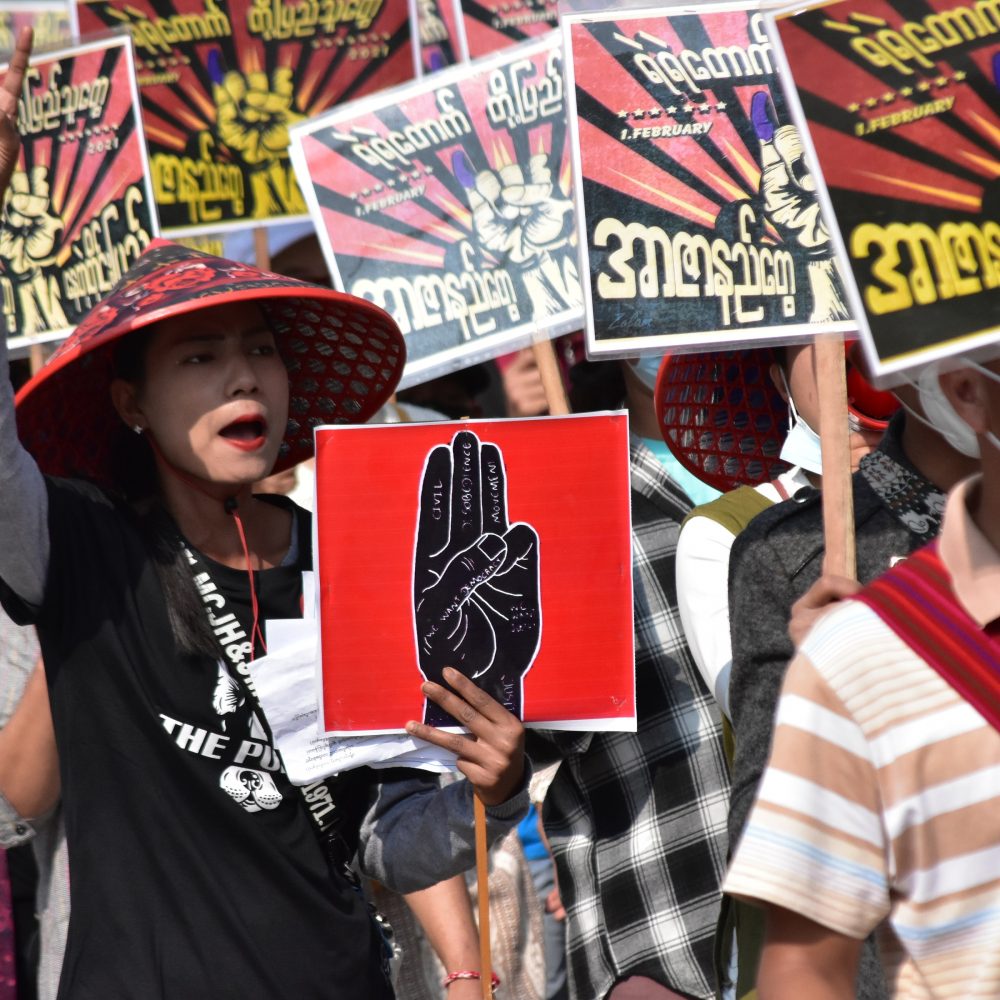The Long Journey of Civil Society in Myanmar
Hnin Htet Htet Aung
(Master’s student, School of International and Public Policy)
March 14, 2023
Introduction
Myanmar, also known as Burma, has a long history of military dictatorships that have inflicted human rights violations and caused poverty in the country. Under the rule of military regimes, Myanmar has had to confront political, economic, social, health, education, and humanitarian crises for a large portion of its recent history.
The seizure of power by the military junta on 1 February 2021 was the starting point for the country’s darkest days. By May 19 of 2022, the death toll from the military coup had reached over 1,848 people and approximately 13,737 were behind bars and in detention centers. In the meantime, 14.4 million out of a nationwide population of 54 million are in need of humanitarian assistance in the aftermath of the military coup, according to Global Humanitarian Overview 2022. There is ongoing resistance by people from different backgrounds who show their opposition to the coup by conducting peaceful demonstrations in every corner of the country.
In spite of facing legal and political struggles, the pro-democratic people resisting the military coup as well as civil society organizations and actors from different sectors have become crucial in supporting the civil disobedience movement and leading the campaign to cut off the revenue streams of the military junta.
When talking about the ability and capacity of civil society to play a role in the development of a country, this is inevitably related to governance and democracy. The reach of civil society covers the whole process from election observation to the forming of a legislature in parliament. Even after the formation of a government, the role of civil society is important to assist the education, health, and investment sectors; to ensure financial transparency related to natural resources; to alleviate poverty; and to oversee anti-corruption measures. In Myanmar, civil society organizations (CSOs) have also taken the role of urging parliament to guarantee the right to freedom of expression in the constitution.
CSOs are committed to the development of the country through education and training. They are involved in everything from health and poverty alleviation to the legislature, from the countryside to the parliament.
The rise of civil society in Myanmar
Most movements in the late colonial period were led by students and this trend continued for social movements in the independence era. In 1988 the “four-eights” democratic movement was launched by university students and was marked by historic protests where hundreds of protesters were killed by the military. This was a decisive movement for Aung San Suu Kyi to become a political icon.
Later in the same year, CSOs were allowed to register under the State Law and Order Restoration Council. But in 2006 the Council restricted the operation of international non-governmental organizations in Myanmar.
Nearly 30 civil society organizations have been founded in Burma since 2008, and more than 20 during Thein Sein’s government in the aftermath of Cyclone Nargis. Later, under Thein Sein and the National League for Democracy (NLD) government, various civil society organizations emerged.
The 2015 general elections marked a turning point: in forming a government the NLD party moved to the opposite side from CSOs, despite the common ground it had until then shared with such organizations. Nonetheless, emerging civil society groups have been involved in capacity building in the country since 2010, when important areas such as education and health were opened up to the legislature.
Over the past decade, the participation of CSOs has become important for issues related to land, environmental protection, gender equality, child rights, labor rights, women’s rights, peace, natural resources, anti-corruption, and responsibility. This more established role of civil society can be clearly seen as the country embarks on its transition to democracy. Civil society networks can be categorized into six different groups: policy advocacy networks, post-Nargis networks, HIV-related networks, civil society umbrella networks, media networks, and producer networks, according to a study of civil society networks.
The challenges for civil society
Whether CSOs have been able to propel the country along the path to democracy in the past few years under the successive governments of the USDP and Aung San Suu Kyi’s civilian government is still subject to question.
Civil society advocates highlight issues such as the draft association law introduced by the Thein Sein government, and the prosecution and imprisonment of human rights and environmental activists during both the Thein Sein government and the NLD government. For example, under Section 505 (b) of the Penal Code for “disturbing public tranquility” by causing public fear or alarm, Karen environmental activist Saw Tha Phoe was issued an arrest warrant by the NLD government as he raised concerns about the cement factory operated by Myanmar Economic Corporation under military control. This is one clear indication of the shrinking space for civil society in Myanmar.
When the NLD government took office after the 2015 election, its position became uncomfortable vis-à-vis civil society as the government was ill inclined to accept critique along with check and balance measures. The NLD government faced criticism for its reduced willingness to grant civil society a larger role in the public sphere.
After the transition period, Myanmar drifted once more into turmoil when the military staged its coup in February 2021. Many CSOs were forced to suspend operations and to close their offices. This is just one of the negative consequences of the coup for the development of civil society in the country.
The stance of civil society
During the 10 years of two successive regimes, civil society groups have sided with the people, and this support has continued in face of the current unjust military rule in Myanmar. Indeed, civil society has become an arena of collective action to provide checks and balances for the performance of government. In that sense, CSOs have shown their solidarity with the people of Myanmar. As mentioned by Frontier Myanmar, “civil society members were threatened and arrested by the junta for providing support to affected people needing food, oxygen supply and medicines which the junta did not contribute, even in the COVID period.”
Civil society activists have called for an immediate end to the violence in the country despite the failure of rule of law to protect the civic space in this decade. To ensure that Myanmar people have access to accurate information in the face of difficulties such as blackouts has also become a task for CSOs. Importantly, these organizations advocate to make the world aware of the brutal crackdown by the military council in the country.
Despite the difficulties confronting both local and international CSOs in the wake of the coup, they have been steadfast in supporting three broad responses: survivalist; transition to service delivery and community-based activities; and reform & resist in order to continue their operations, to deliver services and support to communities, and to align with local democracy movements.
Regarding the global Extractive Industries Transparency Initiative (EITI), the first steps were taken by Myanmar in 2014. It was all about Thein Sein’s willingness to implement the EITI process for better governance of natural resources. The process encountered challenges in convening a multi-stakeholder group (government, private sector, CSOs) in order to guarantee the freedom of speech and operation of civil society, in accordance with EITI requirements. Moreover, civil society actors from the multi-stakeholders group encountered barriers in urging the government sector and private sector, including military companies, to disclose all the requisite information about tax and revenue which needs to be reconciled in the EITI report. Thus, there were resulting discrepancies in the final report which can be seen as the efforts of civil society to take an important role for transparency matters.
Civil society organizations have been making every effort to raise their voice and be heard by the international community, to prevent deaths and human rights abuses, to exert economic pressure and impose an arms embargo, and to ensure that humanitarian aid reaches those who urgently need it. In the meantime, CSOs are performing as a complementary mechanism to the state in order to seek justice and accountability on the issues of the Rohingya crisis and the terrible crimes committed by the military in ethnic areas for many decades. Because strengthening political accountability is at the core of civil society, there is supposed to be a mechanism for CSOs to work with the National Unity Government (NUG) through the National Unity Consultative Council.
Conclusion
Civil society is essential for a nation’s development, filling the space left untouched not only by government but also by the private sector. Especially in Myanmar which is beset by patterns of conflict, civil society provides an important source of information for citizens defending human rights and upholding social norms and behaviors. Therefore, helping sustain civil society will be the big picture for donors and aid from the international community, in support of development and democratic values.
Governance bodies should acknowledge the necessary role played by civil society organizations in complementing the services provided by government in the development of society and the country. To this end, CSOs should be visible and accessible to the people. On top of that, it is essential for state actors to accept the checks and balances that civil society provides, and work to ensure and maintain adequate space for civil society to function.
After all, Larry Diamond stressed that “a democratic state cannot be stable unless it is effective and legitimate, with the respect and support of its citizens. Civil society is a check, a monitor, but also a vital partner in the quest for this kind of positive relationship between the democratic state and its citizens.” With that said, it is clear to see the role of civil society for democracy in Myanmar.
Hnin Htet Htet Aung is Master’s student, School of International and Public Policy. She has been a Visiting Researcher at the Graduate School of Law, Hitotsubashi University. Ms. Aung has nine years of experience working in civil society, international non-governmental organizations, and a Singapore-based advisory firm. Before being a visiting researcher, Ms. Aung worked as a program director at Citizen Action for Transparency (CAfT – Myanmar). Prior to that, she was a program manager at the National Coordination Secretariat – Myanmar Extractive Industries Transparency Initiative (MEITI)and program officer at Norwegian People’s Aid and other organizations. Through her work, she has supported civil society organizations and their activists. She has published articles about the political situation in Myanmar, women’s rights, transitional justice, collective actions and freedom of expression, in both Burmese and English. She holds a master’s degree in public administration from Aldersgate College, Philippines, and a bachelor’s degree in law from Dagon University, Myanmar.


